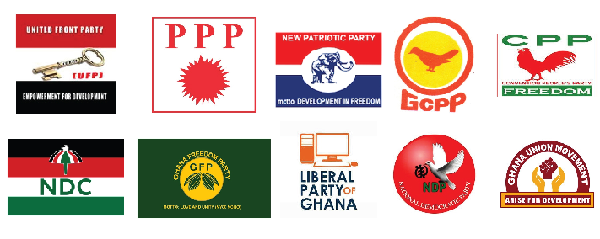In May this year, I gave a talk on intra-party democracy in Ghana. In preparation for the talk, I read the constitutions of the National Democratic Congress (NDC) and New Patriotic Party (NPP), our two main political parties. I was quite struck by their elaborate political-administrative structure.
Such a structure faces many challenges including coordination and financing across multiple levels. I began to think of whether the obligation imposed upon the State, as per Article 55 of the constitution, to provide non-financial forms of assistance to political parties could serve as a basis for state financing of political parties.
What CDD-Ghana found in 2005
In 2005, the Centre for Democratic Development (CDD-Ghana) undertook a project on this topic. The study drew on three main sources of data – elite surveys, household surveys and focus group discussions (see Research Papers No. 13: Political Party Financing in Ghana for the full report on the CDD-Ghana website).
The findings of the study are rich and informative but for the purpose of this piece I highlight four - 1) When asked, “do you Support State Funding of Political Parties in Ghana?” fifty-three per cent (53%) said yes; forty-three (43%) per cent said no, and four (4%) per cent said don’t know; 2) When asked to state their agreement or otherwise to the following statement “The State should fund political parties” fifty (50%) per cent agreed, forty-nine (49%) per cent disagreed; 3) When asked “Would you be willing to pay additional tax (direct/indirect or special tax to support political parties)?” sixty-nine (69%) per cent said no, thirty-one (31%) per cent said yes, while one (1%) per cent said don’t know; and 4) when asked to state their agreement or otherwise to the following statement “Political Parties should raise their own funds”, seventy-five (75%) per cent agreed, twenty-two (22%) per cent disagreed, and two (2%) said don’t know.
In essence, there was some support for state funding of political parties, but citizens were not willing to pay for it perhaps because of the view captured in the survey that political parties should raise their own funds.
What Afrobarometer found in 2022
Seventeen years later, Afrobarometer (Round 9, 2022) asked Ghanaians their views on this subject. In response to the statement “Please tell me whether you disagree or agree with the following statement: To curb the current trend in Ghanaian politics where parties and candidates spend so much money during party primaries and national elections, government should provide direct support to political parties during election campaigns” twenty-seven (27%) disagreed, sixty-seven (67%) per cent disagreed, four (4%) per cent were neutral while two (2%) per cent answered don’t know. When asked “If government decides to provide direct support to political parties, how willing are you to pay a special levy or additional tax for this purpose?” sixty-seven (67%) per cent said not at all willing, twelve (12%) per cent said not very willing, thirteen (13%) per cent said somewhat willing, only six (6%) per cent said very willing whiles two (2%) percent said don’t know. When asked “If the government provides direct support to political parties, which of the following would be the best approach” the top three (out of seven) were as follows – 1) Government should not support political parties (29%); 2) Government provides an equal amount of free advertising on state media for every eligible parties (20%); and 3) Government provides direct financial support to every eligible political party (17%).
There is very little support among Ghanaians for state funding of political parties. Over time, between the CDD-Ghana report and Afrobarometer Round 9, the answer to this vexing question is an unequivocal no.
If no state funding, then what?
As previously mentioned, the constitution places an obligation on the state to provide non-financial (equal access to state media to present their programmes and equal amount of time and space to presidential candidates on state owned media. From the public sentiments captured and described so far, funding of political parties will largely remain a private affair as I doubt any government will be willing to go against the tide of public opinion on this matter. Especially with political parties also facing a trust issue in the eyes of the public. Between Round 2, 2002 and Round 9, 2022, those saying they trust ruling parties a lot has declined from thirty-five (35%) per cent to a low of nine (9%) per cent while that for opposition political parties has declined from twenty-three (23%) per cent to a low of seven (7%) per cent.
I am a big proponent of state financing of political parties as I believe it goes a long way to level the playing field among political parties and strengthens the hand of the state in the regulation of the role of money in our politics. But I am in the very small minority on this.
The writer is a fellow at CDD-Ghana

